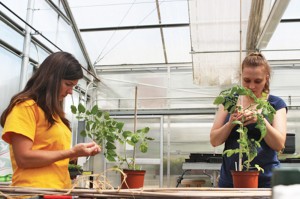
One man’s trash is another man’s treasure, and in the case of the University it’s the food from Winslow Dining Hall that is the treasure of Pullen Farm. Not only are administrators involved in this particular project – students are assisting in the sustainability effort, too.
The garden at Pullen Farm, while it cannot feed the entire campus every day, is an example of how an establishment can eliminate waste and turn it into something useful. It is located off Hickory Avenue.
Tia Johnston, senior from Leitchfield, Ky., is a student manager at Winslow. When she started working in the fall of 2009, Pullen Farm was already receiving compost from the facility. Shortly thereafter, Winslow eliminated trays and added to the savings in food, water and energy.
Johnston said sometimes it is hard to get everyone on board with changes, even those that are good for the environment.
“I believe that Winslow as a whole has had to go through several changes that some students didn’t necessarily like,” Johnston said. “For instance, some people were a bit upset at the loss of the trays. However, it is for the greater good of the student body and the environment. In my experience, you just have to deal with the negative feedback.”
Johnston is optimistic about the University’s plans to be less wasteful.
“I really hope that the efforts continue,” Johnston said. “It is a good way to show that Murray State cares about the environment, and that we’re willing to do our part to conserve energy. I think that it’s a good idea and something that the entire campus should attempt to implement.”
It’s hard to dispute the positive effects of using compost from Winslow to grow food for Winslow. According to the University’s sustainability policy, trimmings from Dining Services kitchens are sent to the compost site at Pullen Farm to be combined with materials such as lawn clippings. To maintain the decomposition, the pile must be routinely monitored for about two months before it is used in the soil. When the produce grown in the amended soil is ready, it is served in Winslow.
Katie LeBlanc, agronomy major from Breckenridge County, has done research with Pullen Farm and is the coordinator for the sustainable garden. This particular program is sponsored by Dining Services. LeBlanc said she hopes that the agriculture department will get involved, because that would mean a shift toward a more environmentally-minded way of life that this part of the country isn’t necessarily used to.
“This area is still very much high-production, profit is the main goal oriented,” LeBlanc said. “Often that puts the environment at risk. Small-scale, sustainable agriculture has a place anywhere in the world.”
LeBlanc said many students are involved at Pullen Farm, though there are only four or five who work specifically with the sustainable garden.
“Any student who wants to come out there to volunteer is welcome,” LeBlanc said. “We also have things for the community, such as Fall on the Farm.”
LeBlanc addressed concerns about the cost of sustainability, which can be initially expensive when implementing new procedures and ways of operating.
“Any cost toward sustainability will obviously be beneficial in the long run,” LeBlanc said. “It will save time and energy, and the idea of the food is quality over quantity. We have saved the University about $400,000 so far.”
LeBlanc said her personal goals include reaching more people with the benefits of the garden. She plans on giving to other communities and specific groups of people, so that living in a healthy way is not just something available to those with money.
“I want to give produce to women and children of domestic violence and to after school programs,” LeBlanc said. “With the economic climate what it is, this is a way to show that healthy food can be grown by anyone and that it can be beneficial in so many ways. Food independence can lead to life independence.”
LeBlanc stressed the importance of making changes for a greener lifestyle.
Said LeBlanc: “There is absolutely no way any university, any town or any person can continue on with what we’ve done in the past. We’re facing detrimental, soul-shaking environmental problems. If we want to have a world for our grandchildren we have to act now.”


























































































